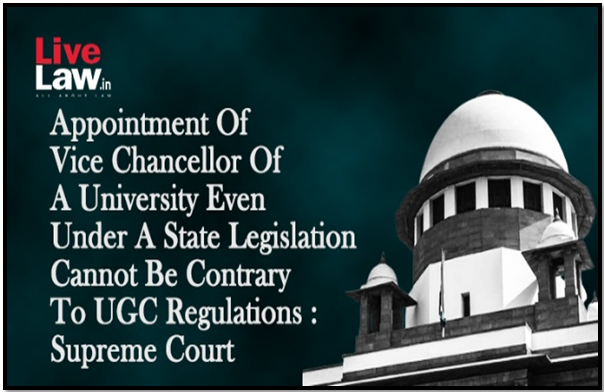THE HYPERPOLITICISATION OF INDIAN HIGHER EDUCATION
Syllabus:
GS 2:
- Appointment to various Posts, Powers, Functions and Responsibilities of various Bodies.
- Statutory, Regulatory and various Quasi-judicial Bodies.
- Issues Relating to Development and Management of Social Sector/Services relating to Education.
Why in the News?
The article highlights the increasing politicisation of Indian higher education, reflecting concerns about academic freedom and autonomy amidst rising political interference, particularly under the current Party in Power government. Recent high-profile incidents and policy changes have brought this issue to the forefront of public discourse.
Source: LiveLaw
Historical Context of Political Influence
- Political Foundations: Indian higher education has historically been intertwined with politics, with politicians founding colleges and universities to boost their careers and build support bases.
- Strategic Placements: Both state and central governments have established new educational institutions in locations that offer political advantages.
- Socio-cultural Demands: Many institutions were created to cater to the electorate’s demands based on various socio-cultural factors.
- Naming and Renaming: The naming and renaming of universities, particularly by state governments, are often politically motivated.
- Academic Appointments: Academic appointments and promotions were sometimes influenced by political considerations rather than academic merit.
| Governor and President’s role in Universities
State Universities
Central Universities
Role of Vice-Chancellor
Regulatory Compliance:
|
Traditional Academic Freedom
- International Norms: Traditionally, Indian higher education adhered to international norms of academic freedom, especially at the university level.
- Freedom to Teach: Professors generally had the freedom to teach without fear of disciplinary action or termination based on their views.
- Research and Publication: Academics were able to conduct research and publish their work freely, contributing to public forums and media discussions.
- Bureaucratic Challenges: While universities often faced bureaucratic hurdles and occasional political interference in faculty recruitment, they enjoyed relative autonomy in promoting existing faculty.
- Academic Integrity: Despite political influences, many institutions maintained a degree of academic integrity and independence.
Fundamental Political Changes
- Increased Politicisation: Indian higher education has become increasingly politicised, posing a grave danger to academic institutions and intellectual life.
- Illiberal Trends: These changes are part of broader illiberal trends in Indian society and are not unique to India, reflecting a global phenomenon.
- Global Perception: The deterioration of academic freedom may affect India’s international reputation and its aspirations to join the top tiers of global higher education.
- Political Appointments: Politically motivated appointments of university vice chancellors have become common, often involving individuals with little higher education experience.
- State Governors’ Role: Non-Party in Power state governments are attempting to remove centrally-appointed state governors as chancellors of state universities to regain control over vice-chancellor appointments.
Examples of Change
- Rahul Gandhi’s Comments: Congress Party leader Rahul Gandhi criticized politically appointed vice chancellors, highlighting a significant issue within the Party in Power’s approach.
- Party in Power’s Influence: The Party in Power has been actively replacing university vice chancellors with politically pliable appointees, reshaping universities with politically aligned faculty.
- Historical First: This level of direct political interference in academia is unprecedented in post-independence India.
- Self-censorship: Self-censorship has become common among academics, particularly in the social sciences and humanities, due to fear of repercussions from state authorities or pro-Party in Power media.
- Lack of Protection: Universities have often failed to protect well-known professors who publish controversial material, as seen in the case of Pratap Bhanu Mehta’s resignation from Ashoka University.
Attacks on Academic Freedom
- Sinister Trends: Academic freedom is under severe attack, with senior academics avoiding publishing work that might provoke state authorities.
- Independent Journals: Respected, independent journals are becoming off-limits for many academics due to political pressures.
- High-profile Cases: Prominent cases like Professor Sameena Dalwai’s online smear campaign and police complaint highlight the growing issue.
- Student Involvement: Students are increasingly involved in campus politicisation, sometimes reporting professors for disagreeing with class content.
- Disciplinary Actions: This new dynamic has led to disciplinary actions against faculty members based on politically motivated student reports.
Implications for Indian Higher Education
- Threat to Independence: The politicisation of higher education threatens the independence and freedom essential for academic institutions and intellectual life.
- Need for Academic Freedom: An independent academic sector is crucial for society, allowing academics to engage in unfettered research and publish their findings freely.
- Impact on STEM and Humanities: Academic freedom is vital across all disciplines, including both STEM fields and the social sciences and humanities.
- Top Intellectuals: Many of India’s top intellectuals and analysts are based in universities, making academic freedom particularly important.
- Global Engagement: As India seeks to build world-class universities and engage with top global institutions, academic freedom and autonomy are prerequisites for success.
Way Forward
- Strengthen Academic Freedom: Ensure that universities have the autonomy to teach, research, and publish without political interference.
- Depoliticize Appointments: Establish transparent, merit-based processes for appointing vice chancellors and other key academic positions.
- Protect Academic Integrity: Safeguard professors from repercussions when publishing controversial or critical work, particularly in the social sciences and humanities.
- Promote Independent Governance: Remove politically appointed state governors from their roles as chancellors to reduce political control over university administration.
- Foster a Culture of Free Expression: Encourage open dialogue and debate on campuses, allowing students and faculty to express diverse viewpoints without fear.
- Enhance Global Collaboration: Maintain high standards of academic freedom to strengthen India’s reputation and partnerships with leading global institutions.
- Address Bureaucratic Hurdles: Streamline administrative processes to reduce bureaucratic obstacles that hinder academic innovation and autonomy.
Conclusion
Indian higher education is at a critical juncture, facing significant challenges due to political interference. Ensuring academic freedom and institutional autonomy is essential for fostering an environment conducive to intellectual growth and global competitiveness.
Source:The Hindu
Mains Practice Question
Discuss the implications of the increasing politicisation of higher education in India. What measures can be taken to safeguard academic freedom and autonomy in Indian universities?




